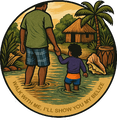Surviving Hurricane Iris: A Belizean's Personal Story & Travel Lesson
October in Belize is hurricane season—and we know to stay alert. But back in 2001, when I was still in high school, I didn’t fully understand how serious that could be. Not until Hurricane Iris.
I grew up in Placencia, a coastal village where storms were just part of the conversation every year. My grandma was our early warning system. She stayed glued to the radio, reminding us: “It’s not a threat until it hits 16-17 degrees latitude—somewhere near Jamaica. That’s when you check the charts.” Iris started as one of those distant storms. It was a Sunday. I got ready for school. Life felt normal.
Then everything changed overnight. By early Monday, we were told to pack and evacuate. We spent the day getting our things together. Around 2 p.m., my uncle picked us up in a boat and took us inland to Independence Village. He lived there—and it was considered a safer place to ride out the storm.
Even as the skies darkened early, we tried to stay calm. The adults listened to the news while us kids played. But by 5 p.m., things turned. Wind picked up. Rain started lashing sideways. The mood shifted.
By 7:30 p.m., the storm had fully arrived. Water was pushing through the cracks of the house. I could feel the walls move with the gusts. Suddenly, loud banging—blam blam blam—from the roof. One of the zinc panels had come loose.
Someone had to hold it down.
That someone was me.
With a wire hanger, I hooked the zinc and held on—doing my best to keep it from flying off and triggering a chain reaction. My hands shook. My arms ached. But I held it until the winds died down.
Iris passed quickly. But the silence afterward was heavy.
Three days later, we returned to Placencia. It looked like a war zone. Houses were reduced to splinters. Roads were unrecognizable. I picked through debris, finding what I could from our home—small pieces, fragments of a life interrupted.
What Iris Taught Me About Travel—and Hospitality
Years later, I began working in tourism. That’s when I saw hurricane season from the other side—not just as a survivor, but as someone responsible for others.
I worked at The Placencia Hotel, and when another storm loomed years after Iris, I was the one helping to coordinate guest evacuations. Some bookings were canceled. Others stayed, and we had to act fast. We arranged transfers to San Ignacio inland, a safer zone during hurricanes.
It made me realize how much behind-the-scenes work happens during a crisis. As staff, we had to stay calm and organized. Guests were understandably anxious, especially those visiting Belize for the first time. I guided them through the plan, updated them as the storm developed, and made sure their transition inland went smoothly.
Some accommodations now have formal plans in place—agreements with inland providers to relocate guests as soon as a storm warning is issued. If you’re traveling to Belize between June and November, you should ask:
- Does my hotel have a hurricane emergency plan?
- Will they help relocate me if needed?
- What happens if the storm comes while I’m on site?
These are more than questions. They’re safeguards. Belizeans are used to navigating storms—but it helps when travelers come prepared too.
Final Thoughts
Hurricane Iris shaped the way I see safety, responsibility, and hospitality. It showed me the importance of quick decisions, local knowledge, and steady leadership. Today, as a licensed guide with Belize With Alvin, I help travelers experience the beauty of this country—but I also help them stay safe when the weather turns.
Because in Belize, nature is powerful. But so is preparation.
👉 Want to visit Belize safely during hurricane season? Let’s plan it together »

